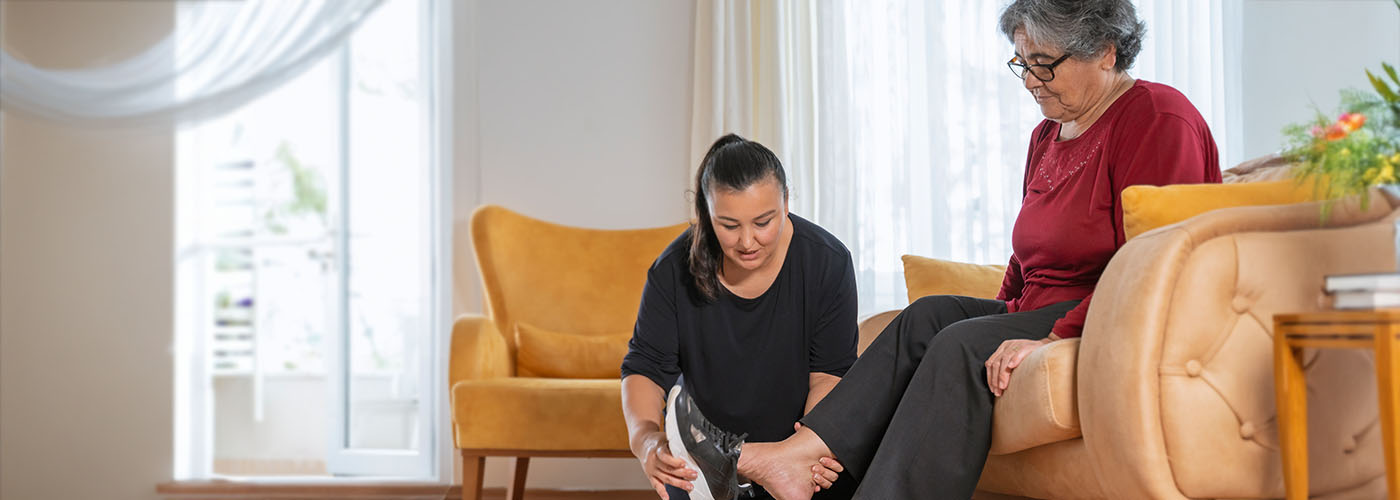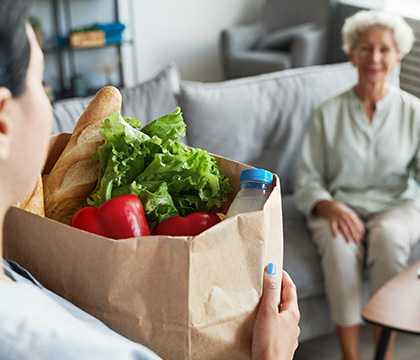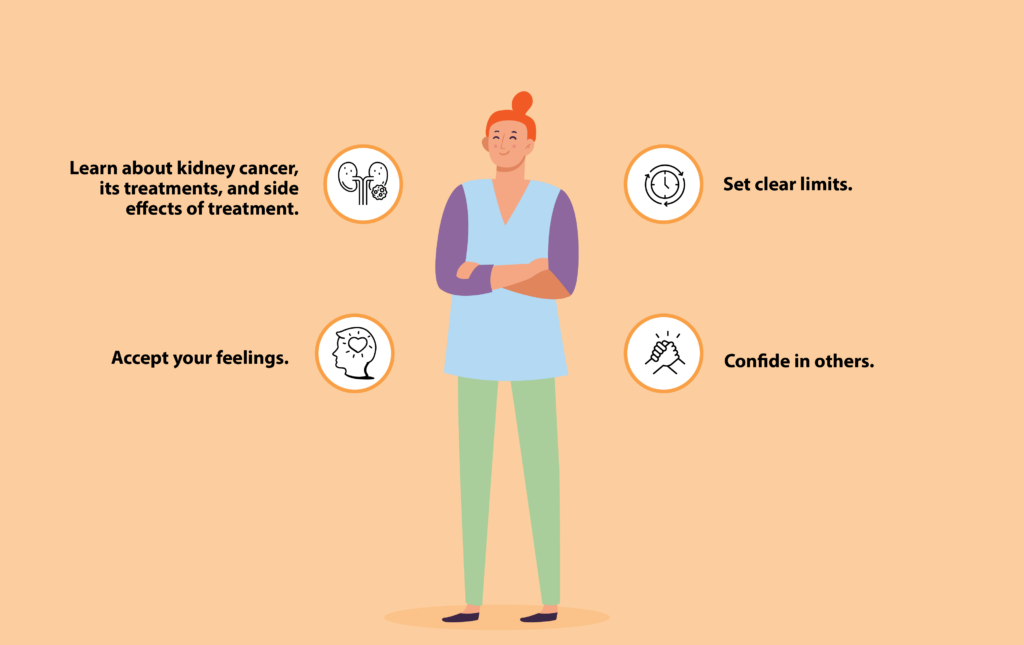
Caregiver Essentials
Caregiving
If you’re helping a loved one through their cancer treatment, you’re a caregiver. Caregiving can be:
- Giving emotional support
- Going with someone to their healthcare visits
- Helping with daily activities, such as personal care, cleaning, or cooking
- Giving medicines or helping with physical therapy

What you might do as a caregiver
Caregivers are often a key part of a person’s kidney cancer care. Your support and encouragement can help your loved one through their cancer treatment.
As a caregiver, you may find yourself in many different roles. You might:
- Be a part of the care team – You may take notes during appointments, and keep track of medical information, paperwork, prescriptions, symptoms, and side effects. It’s important to ask your questions at and in between cancer care appointments.
- Be a problem solver – You may help solve problems and challenges that come up during kidney cancer treatment. For example, your loved one may get sick and need to go to the hospital. You may have to help them prepare for their hospital stay or inform their cancer care team about their hospital stay.
- Take care of everyday tasks – You may help with daily activities. You may shop, cook, clean, do laundry, pay bills, drive, or make appointments. You may even have to help them bathe, dress, or use the bathroom. These tasks can help build a routine and a sense of “normal” for your loved one.
- Be a good communicator – Having good communication with your loved one is the most important part of being a caregiver. It’s important to involve them as much as possible, such as:
- Keep them involved in planning their care.
- Let them make decisions. If they make a choice you are concerned about, such as not taking medicines, talk to them about their options. You may want to talk with their cancer care team for help too.
- Let them know you’re available, but don’t push an issue. For example, if they’re struggling to clean their house, but want to do it by themselves, your first thought may be to do it for them. Instead, let them know you’re there to help when they might need you.
- Encourage them to share their feelings and be willing to listen. Be patient with your loved one as they process their own emotions about their experience.
- Keep others informed – You may need to give updates to family and friends about your loved one’s condition.
Remember that professional help is there for you too. Reach out to their cancer care team if you need help with parts of their care.
Coping with caregiving
Caring for someone with cancer is important, but it can be challenging at times. You may feel you have to put your own needs and feelings aside to focus on caregiving or to be strong for the person you’re caring for.
It can also be hard to be a caregiver on top of other responsibilities like work or family, feeling overwhelmed by the medical system, changing relationships, financial hardship, fear, hope, and uncertainty.
This can be very stressful and hard on your physical and mental health. Stress can lead to fatigue, a weakened immune system, poor sleep, headaches, anxiety, and depression.
But caregiving isn’t a completely negative experience! Caregivers have reported a greater sense of meaning and purpose, as well as deeper relationships with those close to them, especially the loved one they care for.
It’s vital that you take care of yourself – for your own health, and so you can take care of others.

To help yourself and others, you can:
Set clear limits. Think about how much of your time and yourself you can give. Maybe you need time to yourself in the evenings or during the weekends. Maybe you can’t go to every appointment. Let your loved one and everyone involved in their care know your limits. Work with your loved one and their care team to plan for those times when you’re unable to provide care.
Accept your feelings. You may feel many emotions as a caregiver, such as fear, sadness, anger, or helplessness. These feelings are normal and are a common response to the stress and changes in your life. It can make things worse if you ignore or reject these feelings. Let yourself feel them and know that they won’t last.
Confide in others. Talk to others about your feelings, instead of keeping them inside. You can talk with a trusted friend or family member, join a caregiver support group, or talk with a counselor. Be sure to ‘dump out’ and ‘comfort in’.
Learn about kidney cancer, its treatments, and side effects of treatment. If you know more, you can better understand what your loved one is going through. You can be confident you’re giving them the support they need.
When to confide in others and when to offer support: ‘dump out’ and ‘comfort in’
When someone is in a crisis, or going through a hard time, they are in the center of a set of social ‘rings’. The people closest to them (family and close friends) are in the inner rings. People they are not as close to (colleagues and acquaintances) are in the outer rings. When you are in the center of the rings, you can ‘dump out’, or talk about your crisis to those in your outer rings. And when you are in the outer rings, you should only offer ‘comfort in’ to those in the inner rings. For example, give words of support or comfort instead of offering advice or trying to shift attention to your own problems. Keep this in mind when sharing your thoughts and feelings with others.
Taking care of yourself
Self-care is an important part of being a caregiver. It’s a way to focus on your own mental, emotional, and physical needs. It can also help you manage stress and anxiety, avoid burnout, find community, and recharge.
Here are some ways you can take care of yourself:
- Take at least 15-30 minutes per day to relax and do something you enjoy
- Keep up with your regular activities, as much as you can
- Ask for help from others
- Have a way to express your own thoughts and feelings, such as journaling
- Join a caregiver-specific support group in-person or online
- Connect with people who make you feel loved and supported
- Keep up with your own checkups, screenings, and medical appointments
- Be mindful of signs of depression or anxiety, such as feelings of sadness or worry that don’t go away after a few weeks
- Eat healthy meals
- Give yourself permission to rest
- Move your body each day
Making future decisions
There may be times when your loved one isn’t able to make decisions about medical care, finances, or other important topics. It may be helpful to ask your loved one to complete forms like advance directives before this happens. These forms explain how they would like decisions to be made or who should make those decisions if they can’t do so in the future.
To learn more about advanced directives:
Interested in more support?
- Check out KCA’s monthly virtual Caregiver Connections support group
- Imerman Angels provides one-on-one support for caregivers and family members through a peer mentor program. Connect with those who are going through a similar journey.
- Learn more about caregiving, coping, and self-care:
- Read the National Cancer Institute’s Support for Caregivers booklet
- Visit the American Cancer Society Caregiver Resource Guide
- Caregiver Action Network has several resources, such as Family Caregiver Toolbox and Care Chat.
Watch presentations from experts to learn more:
References:
Information on this page last reviewed: January, 2025
Keep Learning:
The Kidney Cancer Association provides educational literature for anyone impacted by kidney cancer.